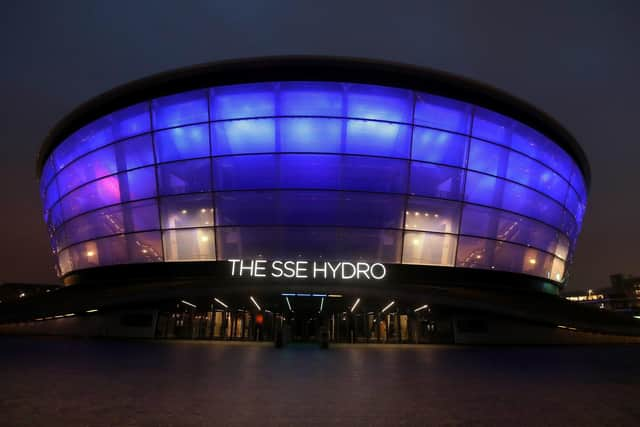Eurovision 2022: When is the final, how to watch and history with Glasgow
and live on Freeview channel 276
Eurovision is beinf hostedTurin, Italy, this year. The competition has its first semi-final on Tuesday (May 10), and second semi-final on Thursday (May 12) ahead of the grand finale which takes place on Saturday (May 14).
How to watch Eurovision 2022
The Eurovision grand final will be broadcast on BBC One and BBC iPlayer and on BBC Radio 2 and BBC Sounds.
Advertisement
Hide AdAdvertisement
Hide AdIt’s scheduled to take place on Saturday, May 14 at 8pm. Meanwhile, the first Eurovision semi-final will take place on Tuesday, 10 May
The second semi-final takes place on Thursday, 12 May.


Who is UK Eurovision entry Sam Ryder?
TikTok star Sam Ryder has been announced as the UK entry for the 2022 Eurovision Song Contest.
The singer-songwriter will perform the track Space Man at the grand final in Turin, Italy, in May.
Ryder found fame covering songs on TikTok during lockdown and has so far accumulated 12 million followers, making him the most followed UK music artist on the platform, according to the BBC.
Advertisement
Hide AdAdvertisement
Hide Ad“Having been a fan of Eurovision since I was a kid, I am so honoured to have been presented with the opportunity to sing at an event alongside some of Europe’s most talented creatives, performers and songwriters,” said Ryder.
Eurovision and Glasgow
In 1969, Glasgow born popstar Lulu represented the UK in the Eurovision Song Contest and was part of a four-way tie with France, Spain and The Netherlands. Her entry, Boom-bang-a-bang, became a huge hit across Europe.
Lulu wasn’t the first Scot to represent the UK. In 1966, at the height of the Swinging Sixties, Paisley-born Scottish tenor and traditional singer Kenneth McKellar was the UK entry for the Contest in Luxembourg.
Although resplendent in a kilt, Kenneth’s song A Man without Love didn’t prove very groovy with juries. He came 9th – at a time when there were only 18 countries competing.
Advertisement
Hide AdAdvertisement
Hide AdIn 1967 the UK chalked up the first of its 5 Eurovision victories with Sandie Shaw performing Puppet on a String. The success of the song was in no small part due to its writer, Govan born Bill Martin.
Martin also wrote the UK entry for the 1968 Contest, a little song you might know called Congratulations, performed by Cliff Richard.
Bill Martin had other attempts at Eurovision glory, including writing the Luxembourg entry in 1975, but never achieved quite the same success.
In 1972, Scotland had a starring role in Eurovision. Because Monaco, the winners of the previous year’s Contest, were unable to host, the BBC stepped in and arranged for the Contest to be held in Edinburgh instead.
Advertisement
Hide AdAdvertisement
Hide AdTwo jurors from each country, including Glasgow’s Doreen Samuels for the UK, sat at tables with Edinburgh Castle’s Great Hall’s iconic armoured knights and weapons behind them.
Scotland had links far and wide that year, with Glasgow born Richard Hill being musical conductor for the Portuguese entry.
Fast forward to 1987, and Glasgow’s Richard Peebles (Rikki), complete with tartan plaid on his white shoulder-padded jacket, was the UK entry to Eurovision with Only the Light. He finished a disappointing 13th, the lowest placing for a UK entry at the time. Little did we know what was to come in later years…
The following year, Glasgow born Scott Fitzgerald represented the UK with the song Go. This turned out to be one of the most exciting votes in Eurovision history. The UK had been out in front of the entry from Switzerland (performed by one Celine Dion) by 15 points but, after the final vote, ended up in 2nd place, losing by only 1 point.)
Advertisement
Hide AdAdvertisement
Hide AdWhile Glasgow itself hasn’t played host to Eurovision in real life, it did have a starring role in the Netflix film Eurovision Song Contest: The Story of Fire Saga, starring Will Ferrell and Rachel McAdams. An exterior shot of the Hydro was used as the contest’s location - despite it being set in Edinburgh. Some scenes were also filmed at Glasgow Airport.
Glasgow’s influence on Eurovision has since been in song writing. John Ballard from Drumchapel penned entries for Azerbaijan in 2013 and for Russia in 2014 and 2016, all of which finished in the Top 10. Songwriter David Sneddon, Paisley born winner of BBC’s Fame Academy in 2002, penned the Greek entry Better Love, for the 2019 Contest.
A version of this article first appeared on our sister site, The Scotsman.
Comment Guidelines
National World encourages reader discussion on our stories. User feedback, insights and back-and-forth exchanges add a rich layer of context to reporting. Please review our Community Guidelines before commenting.